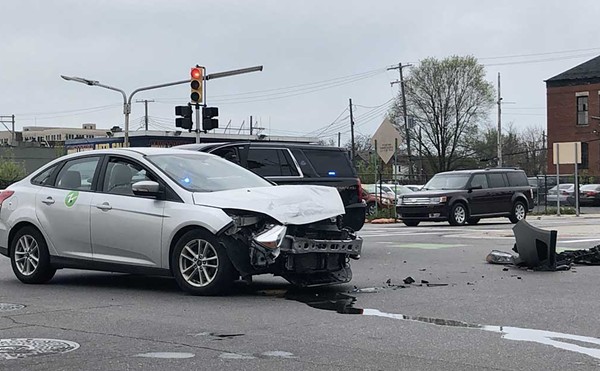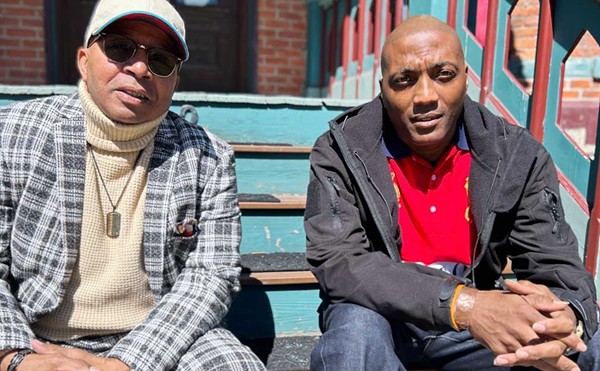Grace Lee Boggs says she would like the chapter titles of her new book, The Next American Revolution: Sustainable Activism for the Twenty-First Century, written with Scott Kurashige, to become buzzwords for progressive activists.
So I imagine "Detroit, Place and Space to Begin Anew" or "We Are the Leaders We've Been Looking For" on T-shirts, trying to fit them on for size in the coming era of struggle to rebuild Detroit and Michigan.
More than just buzzing around, Boggs wants people to really ponder the meaning and implications of those words. "What does it mean to start anew? What does it mean to say we are the leaders we've been looking for?" she asks me rhetorically. "I think instead of growing our budgets, we need to be growing our souls. What are the economics of happiness instead of gross national product? People of every race are beginning to think differently. They're beginning to recognize that life isn't just about making a living. It's about making a life."
Boggs is a political philosopher whose thought and activism have been reaching around the globe from her modest home near Mack and East Grand Boulevard. Last week, I sat down with her and Kurashige, a Boggs Center board member and director of AC Asian/Pacific Islander American Studies at the University of Michigan, to ask how her ideas relate to some of the tumultuous events taking place these days. The large, though not fancy, brick house is filled with books and papers. It's not an advertisement for the electronic age and predictions of a paperless society. Boggs, the daughter of Chinese-American restaurant owners, earned a Ph.D from Bryn Mawr in 1940, became a leftist, and married black autoworker-activist James Boggs. The Boggses collaborated with the Marxist historian and theorist C.L.R. James during the 1950s, and, starting in the 1960s, set their own course, writing several books either separately or together. These days, Grace, a widow recently turned 95, is the leader of the nonprofit Boggs Center, headquartered at her home, which is the hub around which a number of efforts — Detroit Summer, the Allied Media Project, Detroit City of Hope, the Detroit Coalition Against Police Brutality and others — maintain their philosophical grounding and connection to a broader, growing movement in Detroit.
Boggs' revolution is not a call to seize political power from the government. "A cultural revolution has begun to take place," says Boggs. "It's a phenomenon as historic and as far-reaching as the transition from hunting and gathering to agriculture, and from agriculture to industry. Now we're at the heart of a change from industry to a world where people work not so much at jobs. Work is something that we do to develop skills as much as to produce goods and services. We're so used to the idea that we work in order to make money, but that's not why people have worked throughout history and that's the kind of way we're going now. It provides a very different perspective of revolution. It's not about seizing state power to plan the economy.
"The new focus of work is to develop one's ability and one's capacity to do a whole lot of things. For example, we're going into a period where, instead of people doing mass production line stuff, people will think much more of craftsmanship, which involves the development and expansion of the human being."
Indeed, that is a turn away from the revolutionary ideals of the past few centuries. Boggs has witnessed revolutions, rebellions and plain old social upheaval, and struggled with the idea of what those things mean. She was here and took part in the hope and euphoria that accompanied Coleman A. Young's election as mayor of Detroit. But over time she saw that having a black mayor wasn't enough to change the larger economic order, as she writes in Next:
But even though he was one of this country's brightest and most skillful politicians, he was helpless in the face of the deindustrialization and outsourcing that were gaining momentum in the 1970s. Because he had failed to think seriously about the profound changes taking place in the economy, he had no idea how to deal with the new information technology and the massive export of jobs overseas that was making it impossible for young people to find meaningful paid work in the city.
All Coleman could do was react, and he was ultimately driven to desperate measures to try to replace the jobs that were gone for good.
Boggs sees Detroit as the forefront of changes sweeping the industrialized world. Once the front line of industrialization, Detroit could be the model of what the future of the deindustrialized world looks like. That thought has led her to work on seemingly small projects in Detroit neighborhoods.� For instance, she sees urban gardening as the beginning of a major shift in the way we feed ourselves as well as a way to connect generations in a widely inclusive movement.
"Detroit, because we have this position in the history of the country and the world, is creating that alternative — not in words but in action," she says. "There's a group on the east side called Feed 'Em Freedom Growers; if you don't have food you can't be free. Detroit has over 1,000 community gardens. Urban agriculture started very simply with some African-American women seeing some vacant lots. That's how big changes take place, with small changes. Important changes always start from the bottom up. We think they come from the top, or start with millions of people. No, they start when some people respond to the historical context and do what needs to be done. That's how revolution takes place."
This revolution is a turning away from the capitalist ideals of more and more, and bigger and bigger. She says that we are in the end days of capitalism as we have known it for the past few centuries. And the new order is being fought over in places like Madison, Wis., and Lansing, in North Africa and even in the way Japan responds to man-made and natural disasters.
Anyone who has paid attention to Boggs' ideas in the past will see that the narrative of Next builds upon ideas she has been developing for some time. She cites a section from Jimmy Boggs' Revolution and Evolution in the Twentieth Century: "The revolution to be made in the United States will be the first revolution in history to require the masses to make material sacrifices rather than to acquire more material things."
Does that sound like anything that is going on around you these days?
It's the sense that things predicted in Next are already engulfing us that makes it so compelling. And the sense that we have a hand in the outcome rather than being swept along on the sea of change that makes it vital.
Boggs tasks each individual with building the world we want. Some months ago a friend asked me who I thought would succeed her as leader of the Boggs Center. To take the message of Next to heart, that leader would be all of us.
Discussion and book signing with Grace Boggs at 4 p.m. on Sunday, April 3, at the First Unitarian-Universalist Church, 4605 Cass Ave., Detroit. At 4 p.m. on Monday, April 4, she discusses the book with Robin D.G. Kelly at the University of Michigan Modern Languages Building, 812 E. Washington St., Ann Arbor. More at boggscenter.org.







